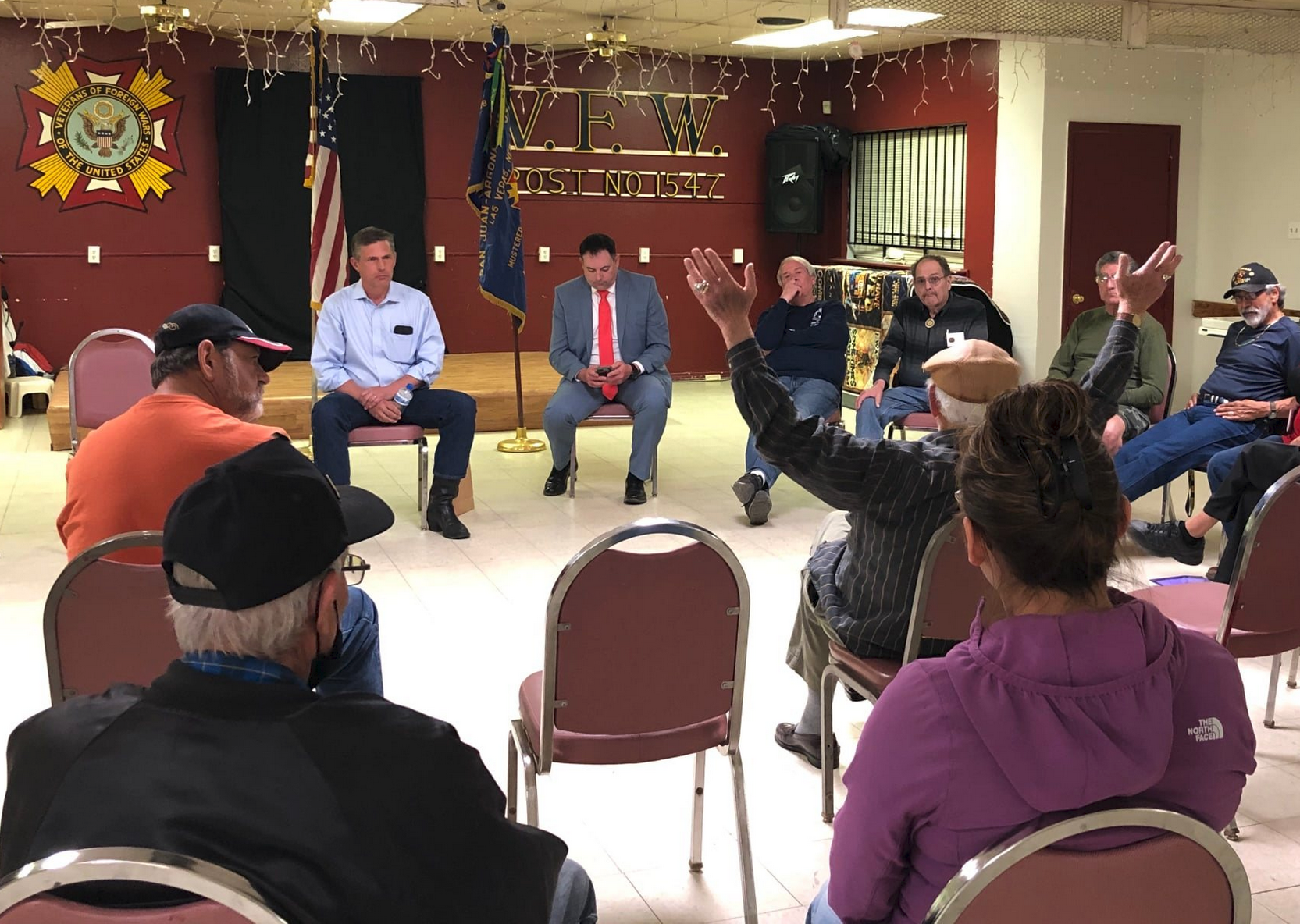Keeping our promise
PHOTO: U.S. Senator Martin Heinrich meets with veterans at VFW Post No. 1 in Las Vegas, N.M., April 19, 2022.
Dear Friend,
Earlier this week, I sat down with veterans in Las Vegas who are worried about not being able to get to the health care they need if the VA’s Community-Based Outpatient Clinic in town closes. Veterans who sacrificed so much for our country should not have to drive hours to access the basic care that they’ve been promised. I hope you can take a moment to read and share the story below from the Albuquerque Journal about my visit.
Ever since the VA released its recommendations to the Asset and Infrastructure Review (AIR) Commission earlier this year that included proposals to close down the community-based outpatient clinics (CBOCs) in Gallup, Las Vegas, Española, and Raton, I have been doing all I can to make sure we keep these clinics open. It is simply not reasonable or responsible to expect many of our veterans—particularly those with mobility challenges—to drive hours in each direction to Albuquerque to access the care they should be able to receive much closer to home.
If you or a family member is having trouble filing a claim with the VA, receiving benefits, accessing health benefits or military records, replacing medals, or other veterans issues, I also encourage you to contact my office by calling (505) 346-6601 or by visiting the Veterans Resources Center on my website. The Constituent Services Representatives in my offices in New Mexico have helped hundreds of veterans all across our state access their care and benefits.
As your United States Senator, I am committed to keeping America’s promise to all of our state’s veterans and their families.
Sincerely,
MARTIN HEINRICH
United States Senator
Heinrich meets with veterans about proposal to close clinics
BY RYAN BOETEL / JOURNAL STAFF WRITER
LAS VEGAS, N.M. – Bob Phillips said he’s been in pain since he was 19.
That’s how old he was when he was badly injured while serving in the Air Force. Now, at age 66, he has two prosthetic knees, several rods, screws and pins in his legs, back and feet. He lives in Las Vegas, New Mexico, and sees a health care professional several times a month.
“Not by choice, I see a lot of doctors,” he said. “I have physical injuries from my military days that get substantially worse as you get older.”
Phillips was one of about 20 veterans who met with Sen. Martin Heinrich, D-N.M., at a VFW post in Las Vegas to talk about how they would be affected by a proposal to shut down four VA outpatient clinics across northern New Mexico. If such closures happen, many veterans will likely have to seek care in Albuquerque, which is almost two hours away.
“With leg and back issues, driving to Albuquerque and back multiple times a month is a challenge,” he said. “It’s a pain. Literally.”
The Department of Veterans Affairs is recommending that VA outpatient clinics in Las Vegas, Raton, Española and Gallup be closed, in part because of a decline in patient volume in the last five years and projected declines for the rest of the decade. The clinics served between 816 and 1,495 patients in fiscal year 2019.
Heinrich, as well as Sen. Ben Ray Luján and U.S. Rep. Teresa Leger Fernández, who represents northern New Mexico, have spoken against the proposed closures.
“Don’t feel like you need to convince me that (the VA clinic) needs to stay open,” Heinrich said at the start of a listening session with veterans on Tuesday evening. “What I need from you is to arm me with the stories of what it’s like to live in a community and to need help where you are, and why it’s unreasonable to have to drive to Albuquerque.”
The VA’s recommendations are found in an Asset and Infrastructure Review report released last month.
The report marks the first step in what could be a yearslong process during which plans could be altered several times, Heinrich said. That will include a review by members of Congress and a presidentially appointed AIR Commission, which will hold public hearings.
The AIR report says that at least three of those northern New Mexico clinics have seen a decline in unique patients in the last five years – Las Vegas by 55%, Raton by 28% and Española by 2.1%. Additionally, the report says that in the next nine years, patient enrollment in the counties where those clinics are located is projected to continue to decline.
Heinrich pointed out that although unique patients may be on the decline, many veterans in northern New Mexico are elderly and require regular checkups and appointments.
James F. Gonynor, an 89-year-old Navy veteran, said he probably averages about 13 visits to the doctor every year. And although he is still driving, he said many veterans his age can’t drive.
An hourslong round-trip visit to see a doctor in Albuquerque could require a veteran’s family member to take a day off work, he said. And he scoffed at the idea of some kind of virtual doctor’s visit.
“I’m not computer literate. I’m barely able to use a cellphone for Christ’s sake,” he said.
The report is also recommending that the Northwest Metro VA clinic in Rio Rancho be closed and instead services be expanded at the VA clinic in Albuquerque. The report says patients in Sandoval County are projected to increase. The Rio Rancho clinic has reached capacity and can’t be expanded, the report said.
“VA came to these recommendations by asking ourselves one question above all else: what’s best for the veterans we serve? Because that is our number one goal, today and every day,” VA Secretary Denis McDonough said in a statement.
Heinrich is the chair of the Senate Appropriations Subcommittee on Military Construction, Veterans Affairs, and Related Agencies.
“So I can hear first hand what they go through to get the care that they earned,” Heinrich said when asked why he met with the veterans. “I think it’s very important to hear those stories first hand for me to be able to make the case that we need to change course.”

